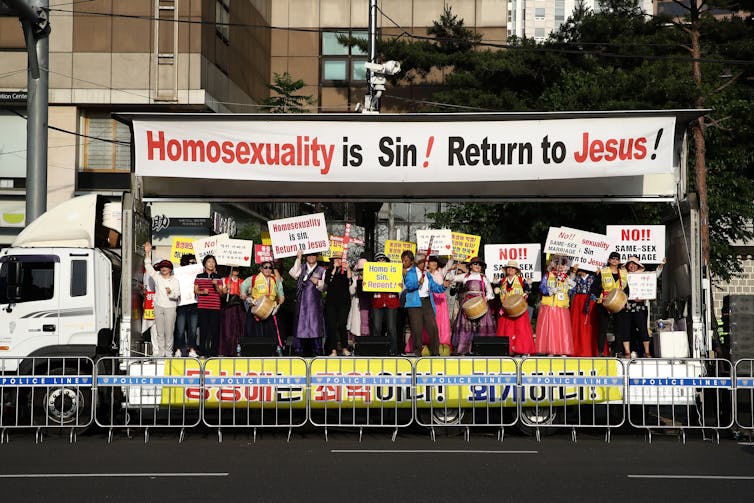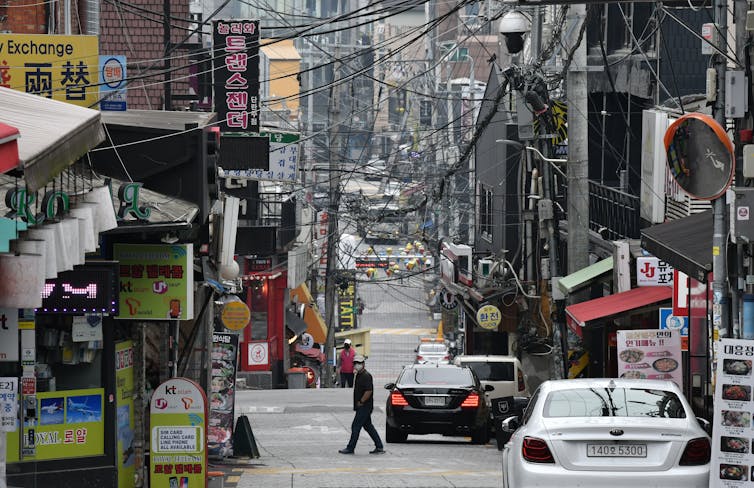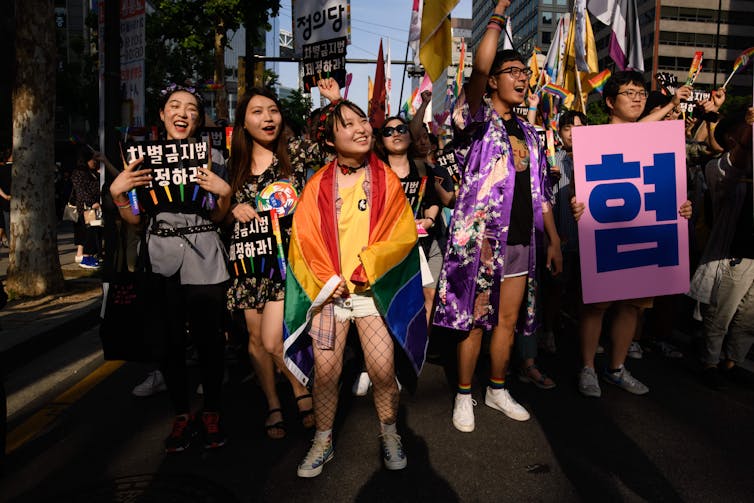Tracing homophobia in South Korea's coronavirus surveillance program
- Written by Timothy Gitzen, Postdoctoral Fellow, Society of Fellows in the Humanities, University of Hong Kong
Many people around the world have looked to South Korea’s so-called “democratic” response[1] to the coronavirus pandemic as a template[2] for other nations to follow. That response is often contrasted with China’s “draconian measures”[3] of forced lockdown in people’s homes.
Key to this global interest is South Korean citizens’ willing participation in mass surveillance technologies and techniques[4], ranging from mandatory testing and financial data collection to cellphone GPS tracking and social media analyses.
Yet my research reveals that widespread homophobia in South Korea is getting in the way[5] of a more effective public health response and may put South Koreans at greater risk of contracting the coronavirus. This was particularly evident in the government’s response to a May 2020 outbreak of coronavirus infections in the country’s queer communities.
 Anti-gay activists demonstrate outside the Korea Queer Culture Festival in Seoul in June 2019.
Chung Sung-Jun/Getty Images[6]
Anti-gay activists demonstrate outside the Korea Queer Culture Festival in Seoul in June 2019.
Chung Sung-Jun/Getty Images[6]
Recent cases of homophobia
Homosexuality is not illegal in South Korea, but there is a strong social stigma against it[7], including decades of discrimination against people living with HIV/AIDS.
For many years, some hospitals have refused to treat people living with HIV/AIDS[8]. Politicians, influential conservative Christian leaders and even doctors have incorrectly claimed[9] that homosexuality causes AIDS. And the government has criminalized HIV transmission[10] and conducts strict surveillance on people who test positive.
Homophobia is also rife in the South Korean military[11], where all men are required to serve for roughly two years. As recently as 2017, the activist organization Military Human Rights Center reported on a “gay witch-hunt”[12] in which the chief of staff of the Korean army coerced soldiers into using gay dating apps, in an effort to identify soldiers who might be queer. Those who came under suspicion through this scheme were charged under the military’s anti-sodomy law, a law that ostensibly makes homosexuality illegal in the military. Some soldiers were also imprisoned[13].
In 2015 that discrimination intersected with a rapidly spreading disease, during the Middle East respiratory syndrome outbreak. Conservative Christians began spreading rumors nationwide – including in Korean news media[14] – that there was a so-called “super virus” combining AIDS and MERS.
The resulting fears about HIV/AIDS and the perceived dangers of queer people brought droves of anti-LGBTQ protesters to a queer culture festival in Seoul in June 2015. When I spoke there to one male protester, he gestured to festival-goers across the street, saying they had the so-called “super virus,” but explained that the people with him were protected by the Holy Spirit.
That year, South Koreans suffered the worst MERS outbreak outside the Middle East and largely blamed an ineffective government response[15] for the illnesses and deaths. In the wake of that epidemic, the current South Korean government remade its pandemic plans, which added unprecedented levels of public information and testing. But in the move toward transparency, queer communities that rely on anonymity to protect against homophobia are facing renewed discrimination.
 A man wearing a mask walks through the Itaewon district of Seoul, South Korea.
Jung Yeon-Je/AFP via Getty Images[16]
A man wearing a mask walks through the Itaewon district of Seoul, South Korea.
Jung Yeon-Je/AFP via Getty Images[16]
Coronavirus outbreak in queer communities
During the week of April 27, 2020, Korean bars and clubs were allowed to reopen after the government eased some nightlife restrictions. On May 1, a Korean man in his late 20s visited a series of bars[17] and clubs in the Itaewon district of Seoul. The following day he felt ill and tested positive for the coronavirus.
At that time, the Korean Center for Disease Control and Prevention began trying to figure out who might have come in contact with the man. The agency used records of financial transactions from those clubs and bars, GPS tracking of mobile phones in the area and direct interviews with potentially affected people.
Some of the media reports included the names of the establishments the man had been to; others specifically identified them as gay clubs[18]. That led to queer Koreans and their lifestyles being blamed[19] for 79 new cases appearing in May 2020.
Many queers feared that contact tracing would forcibly out them[20], especially since some Korean media outlets took to reporting the identities[21] of the venues’ customers and where they worked. Queer South Koreans are withdrawing from social media and dating apps[22], fearful that they might be trapped into being outed live online.
All of that homophobia has made it harder for public health officials to track down and test the thousands of people who visited the bars and clubs.
To ease the fear of being outed, the government instituted anonymous testing[23] for those connected to the most recent outbreak. But that doesn’t solve the problem.
The process of contact tracing includes talking to the friends, relatives, co-workers and other close connections with a person who may have been exposed to the coronavirus. In South Korea, the latest outbreak is so closely linked to queer communities that any mention of a possible exposure – much less a positive test result – is, effectively, the same as being outed at home, at work and in private social life. The surveillance technologies themselves are the problem.
 A scene from a pride parade in Seoul, South Korea, in June 2019.
Ed Jones/AFP via Getty Images[24]
A scene from a pride parade in Seoul, South Korea, in June 2019.
Ed Jones/AFP via Getty Images[24]
The problem with surveillance
Surveillance[25] has historically been used in South Korea[26] to weed out suspected communists and individuals considered to be immoral or violating social norms. In addition, some of the specific techniques have been used in crime prevention and policing – like collecting and analyzing social media data[27] and cellphone subscriber information[28]. That means public health can come at the expense of people’s privacy and livelihoods.
One man who visited Seoul’s gay district told the Guardian[29] that he felt “trapped and hunted down” by the government because it required his credit card company to report his financial transactions in the area: “If I get tested, my company will most likely find out I’m gay. I’ll lose my job and face a public humiliation. I feel as if my whole life is about to collapse.”
South Korea’s coronavirus surveillance program is alerting the public about new disease outbreaks, but at the expense of marginalized communities that rely on anonymity and privacy. A coalition of 23 groups, calling itself “Queer Action Against Covid-19[30],” is conducting a survey to see how widespread these problems are – in hopes of finding effective ways to protect public health that also respect the privacy of Korea’s queer communities and other vulnerable populations.
[Get the best of The Conversation, every weekend. Sign up for our weekly newsletter[31].]
References
- ^ “democratic” response (thediplomat.com)
- ^ template (talkingpointsmemo.com)
- ^ “draconian measures” (www.scmp.com)
- ^ mass surveillance technologies and techniques (theconversation.com)
- ^ getting in the way (blog.castac.org)
- ^ Chung Sung-Jun/Getty Images (www.gettyimages.com)
- ^ strong social stigma against it (doi.org)
- ^ have refused to treat people living with HIV/AIDS (medium.com)
- ^ incorrectly claimed (thediplomat.com)
- ^ criminalized HIV transmission (www.eastasiaforum.org)
- ^ South Korean military (www.academia.edu)
- ^ “gay witch-hunt” (koreaexpose.com)
- ^ imprisoned (www.nytimes.com)
- ^ Korean news media (www.yna.co.kr)
- ^ blamed an ineffective government response (www.theregreview.org)
- ^ Jung Yeon-Je/AFP via Getty Images (www.gettyimages.com)
- ^ man in his late 20s visited a series of bars (www.koreaherald.com)
- ^ others specifically identified them as gay clubs (www.koreaherald.com)
- ^ being blamed (www.washingtonpost.com)
- ^ forcibly out them (www.pinknews.co.uk)
- ^ reporting the identities (www.theguardian.com)
- ^ withdrawing from social media and dating apps (www.theguardian.com)
- ^ anonymous testing (english.hani.co.kr)
- ^ Ed Jones/AFP via Getty Images (www.gettyimages.com)
- ^ Surveillance (doi.org)
- ^ historically been used in South Korea (muse.jhu.edu)
- ^ social media data (english.hani.co.kr)
- ^ cellphone subscriber information (www.nytimes.com)
- ^ told the Guardian (www.theguardian.com)
- ^ Queer Action Against Covid-19 (www.queer-action-against-covid19.org)
- ^ Sign up for our weekly newsletter (theconversation.com)
Authors: Timothy Gitzen, Postdoctoral Fellow, Society of Fellows in the Humanities, University of Hong Kong

